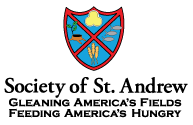Operation Blessing International Relief and Development Corporation (OBI) is an Evangelical Christian organization headquartered in Virginia Beach, Virginia, United States. Founded in 1978, OBI operates in more than 90 countries, focusing on disaster relief, medical aid, clean water, hunger relief, community development, and orphan care programs.

Gleaning is the act of collecting leftover crops from farmers' fields after they have been commercially harvested or on fields where it is not economically profitable to harvest. It is a practice described in the Hebrew Bible that became a legally enforced entitlement of the poor in a number of Christian kingdoms. Modern day "dumpster diving", when done for food or culinary ingredients, is seen as a similar form of food recovery. Gleaning is also still used to provide nutritious harvested foods for those in need. In the United States, it is used due to the need for a national network to aid food recovery organizations. This is called the National Gleaning Project, which was started by the Center for Agriculture and Food Systems at Vermont Law and Graduate School to aid those less fortunate much like the old Christian Kingdoms.

A food bank is a non-profit, charitable organization that distributes food to those who have difficulty purchasing enough to avoid hunger, usually through intermediaries like food pantries and soup kitchens. Some food banks distribute food directly with their food pantries.
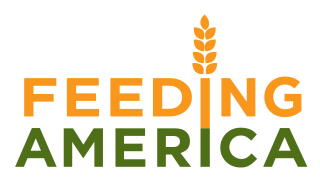
Feeding America is a United States–based non-profit organization that is a nationwide network of more than 200 food banks that feed more than 46 million people through food pantries, soup kitchens, shelters, and other community-based agencies. Forbes ranks it as the largest U.S. charity by revenue. Feeding America was known as America's Second Harvest until August 31, 2008.
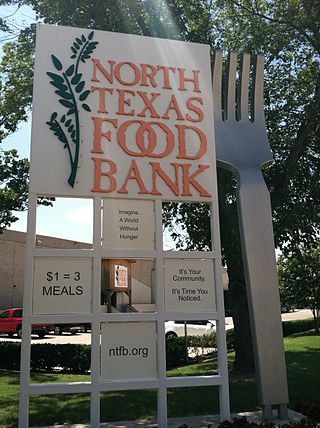
The North Texas Food Bank (NTFB) is a social benefit organization located in Plano, Texas. The organization distributes donated, purchased and prepared foods through a network of nearly 1,000 feeding programs and 400 Partner Agencies in 13 North Texas counties. The NTFB supports the nutritional needs of children, seniors, and families through education, advocacy and strategic partnerships.

The Food Project is a non-profit organization that employs teenagers on farms in Lincoln, Roxbury and the North Shore of Massachusetts. It focuses on community improvement and outreach, and education about health, leadership, charity, and sustainable agriculture. The youth are recruited from urban areas of Boston, Lynn, and surrounding suburbs to plant and harvest crops for sale at Farmers' Markets and CSAs, and donation to local hunger-relief organizations and homeless shelters. The program fosters community building and having a good work ethic.

Food rescue, also called food recovery, food salvage or surplus food redistribution, is the practice of gleaning edible food that would otherwise go to waste from places such as farms, produce markets, grocery stores, restaurants, or dining facilities and distributing it to local emergency food programs.
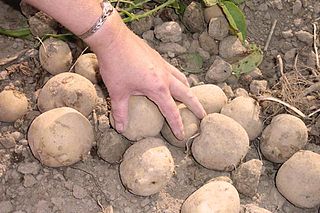
Gleaning Network is the most widespread and volunteer-oriented of the Society of St. Andrew's ministries.

Agriculture in Lebanon is the third most productive sector in the country after the tertiary and industrial sectors. It contributes 3.1% of GDP and 8 percent of the effective labor force. The sector includes an informal Syrian labor and is dependent on foreign labor for its productivity. Main crops include cereals, fruits and vegetables, olives, grapes, and tobacco, along with sheep and goat herding. Mineral resources are limited and are only exploited for domestic consumption. Lebanon, which has a variety of agricultural lands, from the interior plateau of the Beqaa Valley to the narrow valleys leading downward to the sea, enables farmers to grow both European and tropical crops. Tobacco and figs are grown in the south, citrus fruits and bananas along the coast, olives in the north and around the Shouf Mountains, and fruits and vegetables in the Beqaa Valley. More exotic crops include avocados, grown near Byblos, and hashish. Although the country benefits from favorable farming conditions and diverse microclimates, it relies on food imports, which make up 80% of its consumption.
Children's Hunger Fund (CHF) is a Christian non-profit organization that resources and empowers local churches in the United States and around the world to meet the needs of their impoverished community members. CHF's mission is to "deliver hope to suffering children by equipping local churches for gospel-centered mercy ministry".

Farm Radio International, or Radios Rurales Internationales, is a Canadian non-profit organization that was founded in 1979 by CBC Radio broadcaster George Atkins. The organization is headquartered in Ottawa, Ontario and works with radio broadcasters to improve food security and agricultural methods for small-scale farmers and rural communities in African countries.

Leket Israel, The National Food Bank, a registered nonprofit Israel-based charity, is the leading food rescue organization in Israel, serving 175,000+ needy people weekly. Leket Israel rescues surplus agricultural produce and collects excess cooked meals for redistribution to the needy throughout Israel via its network of 200+ nonprofit organization (NPO) partners.

Marin Organic is a non-profit 501(c)(3) association of organic producers headquartered in Point Reyes Station, California. Founded in 1999 with the goal of creating the first all-organic county, Marin Organic is known for working with the government, community groups and organizations, fellow ranchers and farmers to advance the practice of sustainable, organic production. The organization is internationally recognized model for building economically viable, community-based local foodsheds.
International Disaster Emergency Service (IDES) is a 501c3 non-profit organization based in Noblesville, Indiana, United States that seeks to meet the physical and spiritual needs of suffering people around the world in the name of Jesus Christ. The organization is primarily funded by Christian Churches and Churches of Christ. Much of its relief effort is done through local churches and missionaries already in place in the countries needing assistance.
Philabundance is a non-profit food bank that serves the Philadelphia and Delaware Valley regions of Pennsylvania, United States. It is the largest such organization in the region. The organization stated goal is to end hunger in its communities.
Food Donation Connection (FDC), LLC headquartered in Knoxville, Tennessee, is a privately owned American company facilitating the donation process between restaurants/food service companies with surplus food and local social service agencies that distribute food to those in need. FDC's primary goal is to redirect prepared food that would otherwise be discarded towards feeding individuals facing hunger.
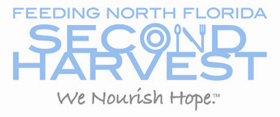
Second Harvest North Florida (SHNF) is a 501(c)(3) non-profit organization located in Jacksonville, Florida, that performs food rescue and redistribution to partner agencies in one quarter of Florida's 67 counties. The charitable organization has been active for over 30 years.
Iskashitaa Refugee Network is a grass roots organization based in Tucson, Arizona, that partners with volunteers and local organizations to provide various supplemental services to refugees to complement those offered by resettlement agencies. The organization was founded by Dr. Barbara Eiswerth, who holds a Ph.D. in Arid Lands Resource Management, and is currently directed by Eiswerth. Iskashitaa has a number of programs designed to empower refugees and unite them with staff and volunteers from the community. A primary component of these programs is gleaning, or harvesting unwanted produce from property owners and commercial farmers. Iskashitaa's gleaning efforts have grown from harvesting a few thousand pounds of fruit each year to over 100,000 pounds annually of fruit, nuts, and vegetables: a cumulative one million servings of local produce.
Forgotten Harvest is a non-profit food rescue organization that collects food that would otherwise go to waste and delivers it free of charge to organizations feeding the hungry in Metro Detroit. In 2015, the nonprofit distributed more than 40 million pounds of food to more than 260 emergency food providers.

The Farmlink Project is a United States-based non-profit organization that combats food waste by collecting excess produce from farms and other food donors across America and delivering it to organizations that serve food insecure communities. Since its founding in 2020, the organization has rescued over 130 million pounds of food, distributed to over 400 communities, and grown to a network of over 600 volunteers nationwide.
